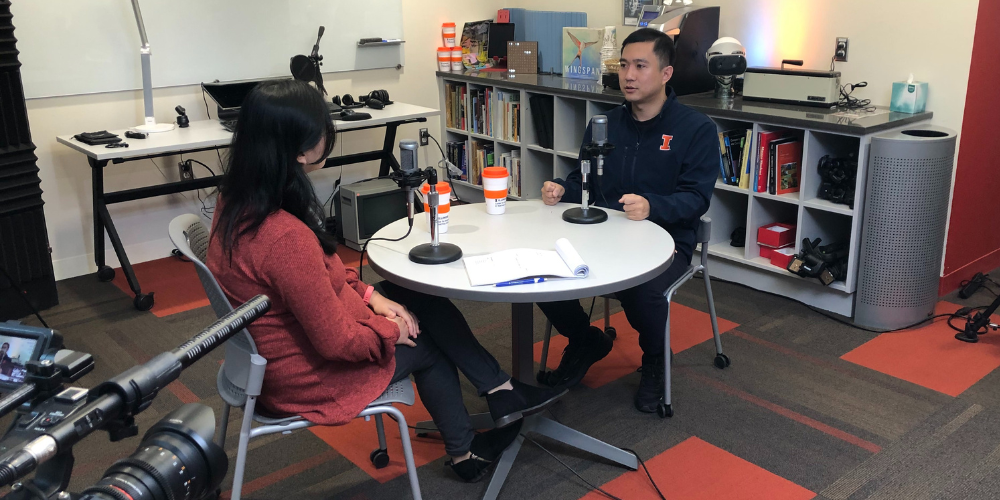
At right, Jiheng Jing discusses AristAI during a Teach, Talk, Listen, Learn podcast recording.
By Robert Baird, CITL Senior Associate Director
Jiheng Jing is a frequent and skilled user of GenAI, using it for his projects, studies, and recent entrepreneurial efforts. As a TA in Mechanical Engineering, Jiheng has had a firsthand view of GenAI use among students and instructors. Using GenAI daily for personal, professional and academic uses enabled Jiheng to move quickly and co-found AristAI, a startup dedicated to developing AI teaching assistants. These AI teaching assistants are designed for university courses, offering 24/7 responses to students' course-related inquiries, and guiding them to the relevant course content for review.
According to Jiheng: “The main idea is that we use all the course materials to train this AI chatbot [to answer] logistic questions, grading questions or homework questions . . . but also redirect students to the exact location of those lecture materials. If it’s a lecture recording, we will take students to the exact second of that lecture recording.” Additionally, the AI teaching assistant generates detailed analytical reports for instructors, offering valuable insights to help instructors refine and improve teaching strategies.
Jiheng met AristAI’s faculty advisor Dr. Tony Zhang, (Gies College of Business Adjunct Clinical Assistant Professor) through the 2022 Cozad New Ventures Challenge. Dr. Zhang had begun exploring AI when he became a Gies College Disruption Lab Fellow in 2021, originally focusing on how AI could assist with student learning around cryptocurrencies. Later, and months before the release of ChatGPT, Dr. Zhang pivoted his project and began exploring how AI could help develop virtual teaching assistants when he realized their potential for helping very busy instructors. While AI developers can create custom chatbots, Dr. Zhang knew that most instructors lacked the time and skills to develop their own virtual TAs.
The AristAI team, comprised of ten students and recent graduates from Illinois, Michigan, Pennsylvania, UCLA and Harvard, is actively involved in both the technological development and the marketing strategy for the AI teaching assistant. Jiheng serves as a leader of the AristAI team, which Dr. Zhang values for Jiheng’s collaborative skills and “success in leadership and willingness to take risks.” In the future, Dr. Zhang believes students and instructors will “leverage the GenAI more often and efficiently to provide customized learning curriculum and customized engagement with course instructors.”
Jiheng knows Illinois well, having started as a freshman in 2015 and is currently finishing his last year as a Ph.D. candidate. As a graduate student aligned with Dr. Gaurav Bahl's Mechanical Science and Engineering research group, Jiheng was well-positioned to understand the value of new technologies and the career paths available for engineering students. His expertise and appreciation for GenAI stems from his extensive personal and academic use of the tools, where he has been able to refine his language skills, develop computer code, and collaborate with others in the quickly developing world of GenAI.
As a teaching assistant, Jiheng witnessed some of the flaws in the traditional office hours and lab section formats: students asking the same simple questions over and over; students needing to be led to information they already possessed; and some students never seeking help. As an international student, Jiheng was personally aware of the challenges for those speaking English as a second language: difficulty of English grammar, the nuances and colloquialisms of English, as well as the complex vocabularies in academia and in STEM fields. Jiheng explained that when he first came to Illinois he was afraid to ask questions. “I’m afraid that the TA will judge me, even though I know that they won’t. And because I was a TA last year, I never judged students. But as a student, especially international students, I don’t know what’s going to happen—so I’m afraid a human TA will judge me. So I’m afraid to ask questions.”
Currently, AristAI is in pilot mode with several Illinois instructors expressing interest and testing the tool and hoping to employ it in the upcoming fall semester. The tool is being designed to be embedded within campus educational technologies such as Canvas, MediaSpace, and Piazza. The AristAI website allows anyone to create an account and demo the product. Jiheng and the AristAI team are developing an NSF grant and hope to make the AI teaching assistant commercially available. The team is also exploring how multiple AI agents could work as a virtual teaching assistant team, made possible through new tools like the open-source CrewAI framework.
When asked about the current assumptions and practices regarding GenAI on campus among students and teachers, Jiheng felt that many instructors were unaware of the extensive and diverse use of AI by students. “I don’t think we can stop students from using AI. This is the future. It’s better for us to start guiding students to use AI in the right way. For example, I notice many professors ask students not to use AI for their homework, but it turns out that students use AI anyway. We should tell students how to use AI correctly.”
Jiheng highlighted that the flexibility of AristAI allows it to be customized according to the specific needs and preferences of professors. This adaptability ensures that the AI teaching assistant can align with different teaching methodologies and objectives. For example, the AristAI Teaching Assistant team received feedback from professors that the assistant should not directly answer students’ questions but, rather, guide them to solutions. Jiheng notes that the team is fine-tuning the AI teaching assistant so that “whenever a student asks a question it will not directly give them the answer but guide them to the solution like a real TA.” Jiheng believes students can “not only get their answer but also learn while asking the AI teaching assistant.”
Did you like this story? Read more about how University of Illinois faculty are using generative AI in the classroom.